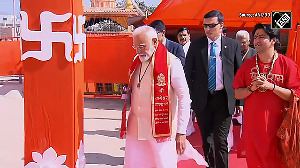Charred bodies and mangled metal of the two burnt coaches of the Delhi-Attari special express, ferrying passengers to Pakistan, bore mute testimony of the ghastly tragedy that left at least 66 dead and several injured.
Bangles and footwear strewn inside the coaches were among the very few items, which survived the fire resulting from the explosions.
It was close to midnight when passengers in two compartments woke up to the smell of smoke and fire. As they scrambled to ascertain the cause, the fire had by then fast engulfed the two bogies. Panic stricken passengers started screaming and rushing to the exit points but leaping flames prevented them from escaping to safety.
"There was a loud noise followed by fire and smoke," an unidentified middle-aged woman from Faisalabad, Pakistan, with burnt marks on her face and bandages on her arms, told media persons.
Onlookers at the site said that villagers and the entire Panchayat rushed to the spot carrying buckets of water to douse the blaze. Fire brigade personnel and medical relief reached the spot after an hour, they said.
Passengers gave two different versions -- one about blast followed by fire and the other that there was only fire, which spread fast. An eyewitness said that a seven-year-old boy was pulled out of the burning bogie.
The Indo-Pak special train, which symbolises peace and friendship between the two countries, was started on July 22, 1976 following the Shimla Agreement and operated between Amritsar-Lahore, a distance of about 42 km.
The train service was snapped on January one, 2002 in the wake of the terror attack on Parliament. It was resumed on January 15, 2004 as part of peace efforts. The bi-weekly train now runs every Tuesday and Friday between Delhi and Attari in India, and Wagah and Lahore in Pakistan.
Passengers from either side cross over at the Attari-Wagah stations for their onward journeys.






 © 2025
© 2025